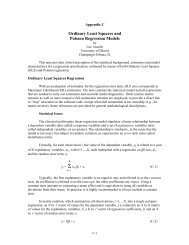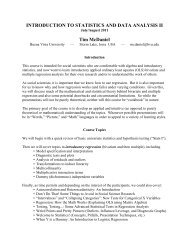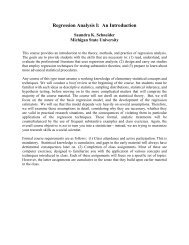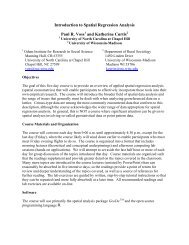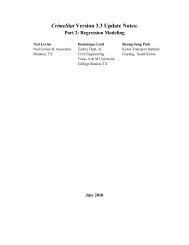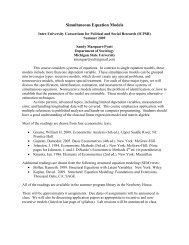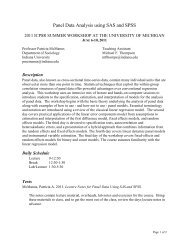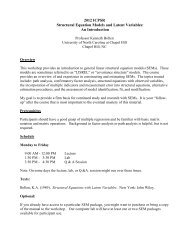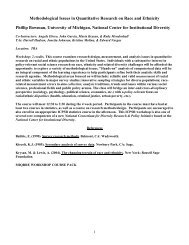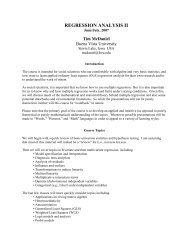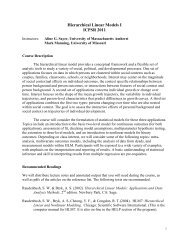Item Response Theory - icpsr - University of Michigan
Item Response Theory - icpsr - University of Michigan
Item Response Theory - icpsr - University of Michigan
Create successful ePaper yourself
Turn your PDF publications into a flip-book with our unique Google optimized e-Paper software.
<strong>Item</strong> <strong>Response</strong> <strong>Theory</strong><br />
ICPSR Summer Workshop at the <strong>University</strong> <strong>of</strong> <strong>Michigan</strong><br />
July 11, 2011 – July 15, 2011<br />
Presented by:<br />
Dr. Jonathan Templin<br />
Department <strong>of</strong> Educational Psychology<br />
<strong>University</strong> <strong>of</strong> Georgia<br />
email: jtemplin@uga.edu<br />
http://projects.coe.uga.edu/jtemplin<br />
COURSE OVERVIEW<br />
<strong>Item</strong> <strong>Response</strong> <strong>Theory</strong> (IRT) is used in a number <strong>of</strong> disciplines including sociology, political<br />
science, psychology, human development, business, and communications, as well as in education<br />
where it began as a method for the analysis <strong>of</strong> educational tests. This course is geared to<br />
individuals who are interested in the foundations and applications <strong>of</strong> item response models as<br />
tools for measurement <strong>of</strong> latent traits across disciplines. The course is designed to acquaint<br />
students with the basics <strong>of</strong> the field <strong>of</strong> item response theory (IRT).<br />
To be successful in understanding analyses using IRT, two factors are important: (1) familiarity<br />
with various IRT models, and (2) the ability to interpret and apply these models appropriately.<br />
This course will begin with presentation <strong>of</strong> popular item response models, their estimation, and<br />
proper interpretation, and then continue reinforcing these lessons throughout the week with<br />
numerous examples and applications using data from different disciplines (including political<br />
science, education, and psychology). Additional topics will include test equating, test<br />
development with IRT, differential item functioning, and computerized adaptive testing. All<br />
topics will be taught in a manner which emphasizes a modern approach to IRT by comparing and<br />
contrasting IRT with other statistical methods that use latent variables or random effects (e.g.,<br />
confirmatory factor analysis, diagnostic classification models). The course will be focused on<br />
accessibility, with technical detail presented only when necessary for responsible application <strong>of</strong><br />
the methods and techniques discussed. Participants should be familiar with basic statistical<br />
models (e.g., ANOVA and regression) and basic psychometrics (e.g., classical test theory), but<br />
no prior experience with item response or other psychometric models is assumed.<br />
The course will utilize s<strong>of</strong>tware developed for estimation <strong>of</strong> general latent variable models<br />
(Mplus). In addition to a course packet, you will receive a CD containing all course materials,<br />
including overhead slides, analysis scripts, output files, relevant supporting documentation, and<br />
recommended readings.
TENTATIVE COURSE SCHEDULE*<br />
Day Time Topic<br />
Monday<br />
Foundations <strong>of</strong> <strong>Item</strong> <strong>Response</strong> <strong>Theory</strong><br />
9:00-10:15 Lecture 1: Historical Perspectives and Basic Statistical Prerequisites<br />
10:30-11:45 Lecture 2: Basic IRT Concepts, Models, and Assumptions<br />
1:15-2:30 Lecture 2, Continued<br />
2:45-4:00 Lecture 3: Model Specifications and Scale Characteristics<br />
4:00-5:00 Lab Activity 1: Introduction to Mplus S<strong>of</strong>tware for IRT<br />
Tuesday<br />
Estimation <strong>of</strong> IRT Models<br />
9:00-10:15 Lecture 4: IRT Models for Polytomous <strong>Response</strong> Data<br />
10:30-11:45 Lecture 5: Estimation<br />
1:15-2:30 Lecture 5, Continued<br />
2:45-4:00 Lecture 6: IRT Models in Political Research<br />
4:00-5:00 Lab Activity 2: Estimation <strong>of</strong> IRT Models<br />
Wednesday<br />
Reliability in IRT/Test Development/Computerized Adaptive Testing<br />
9:00-10:15 Lecture 7: Latent Trait Reliability<br />
10:30-11:45 Lecture 8: Test Development/<strong>Item</strong> and Test Information<br />
1:15-2:30 Lecture 9: Computerized Adaptive Testing<br />
2:45-4:00 Lecture 9, Continued<br />
4:00-5:00 Lab Activity 3: Scale Development<br />
Thursday<br />
Friday<br />
Equating/<strong>Item</strong> and Test Bias/Differential <strong>Item</strong> Functioning<br />
9:00-10:15 Lecture 10: Equating<br />
10:30-11:45 Lecture 10, Continued<br />
1:15-2:30 Lecture 11: <strong>Item</strong> and Test Bias<br />
2:45-4:00 Lecture 12: Differential <strong>Item</strong> Functioning<br />
4:00-5:00 Lab Activity 4: Equating<br />
Advanced IRT Models and Topics<br />
9:00-10:15 Lecture 13: Multidimensional IRT<br />
10:30-11:45 Lecture 14: Diagnostic Classification Models<br />
1:15-2:30 Lecture 15: Ideal Point and Unfolding Models for Political Research<br />
2:45-4:00 Lecture 16: Conclusions: IRT in the Taxonomy <strong>of</strong> Statistical Models<br />
4:00-5:00 Open Lab Time<br />
*A more detailed listing <strong>of</strong> the topics within each lecture and recommended readings for each<br />
topic will be provided with the actual course materials.



